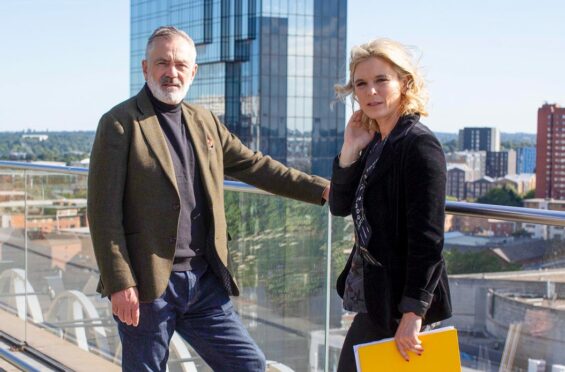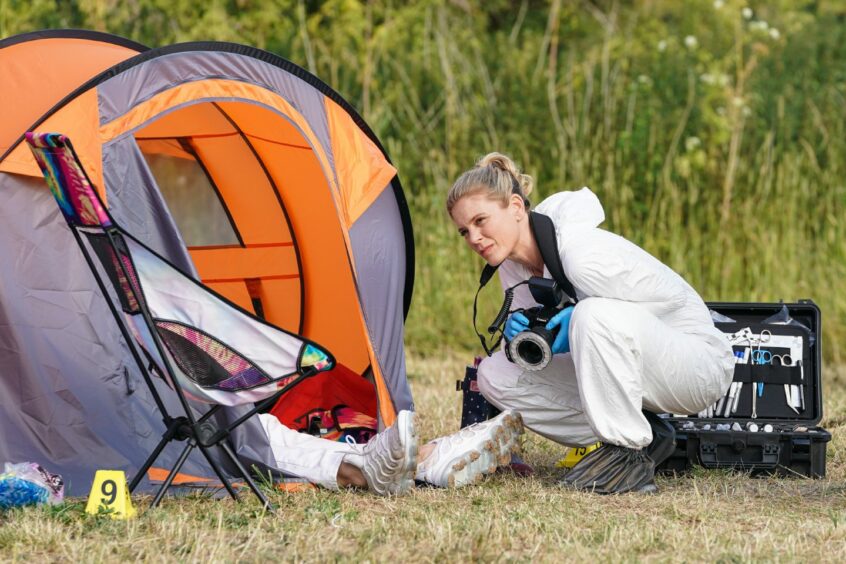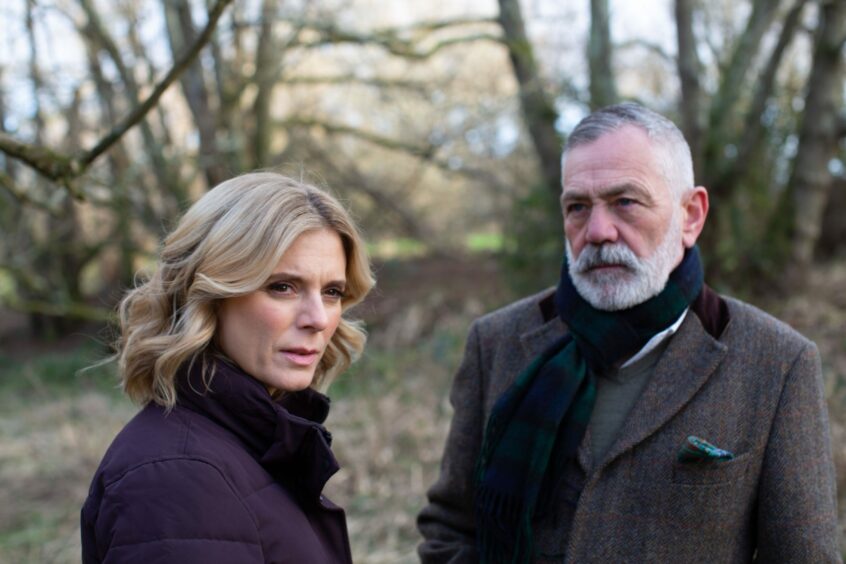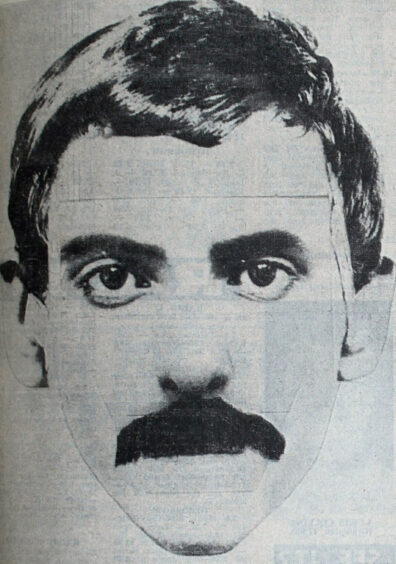
She is best known to viewers around the world as Dr Nikki Alexander, the forensic pathologist in hit BBC drama Silent Witness about to begin a 26th series tonight.
But despite being a self-confessed coward when it comes to horror movies and even Halloween, Emilia Fox has moved from fiction to fact, reopening investigations into real crime.
In the Channel 4 series In The Footsteps Of Killers, Fox, 48, joins criminologist Professor David Wilson and former senior detective and criminologist Dr Graham Hill to investigate unsolved murder cases and look for new leads.
The first episode probes the Templeton Woods murders in Dundee where, in March 1979, 18-year-old Carol Lannen was found strangled. Less than a year later, 150 yards from the spot where Lannen’s body had lain, that of 20-year-old Elizabeth McCabe was also found strangled. The series will also investigate the disappearance in London of Robert Duff, 37, a Scot whose teacher mum Helen is from Dumbarton.
The public’s fascination with terrible, true and unsolved crimes is apparently insatiable but the actress believes retelling these stories comes with great responsibility.
Talking from her home in London, Fox admitted: “I am conscious, working as an actress, that I am not an investigator. That is absolutely the realm of Graham and David but I am there as someone who in real life is constantly asking them the questions that the public would want answers to.
“In Silent Witness I am lucky enough to work with amazingly skilled pathologists, detectives and police in all areas of crime-solving. I am trying to find the heart and truth in Silent Witness and that’s not so dissimilar to wanting to ask the questions in real life.
“But with true crime I feel the cases very much emotionally, and it feels very different. I am investing in it as a character in Silent Witness but in real life you cannot help but carry the emotions and feelings about what has happened to the victims and the people who are left behind.
“I also see the dedicated work that people like David and Graham as an ex-senior investigating officer put into these cases and the new light they have both shed on them.
“That gives it a real purpose as a programme. I am the narrative voice to try to help explain what happened but I am also an audience voice in asking the questions and that is very genuine to who I am.”
Fox – who first worked with Wilson on the 2019 documentary Jack The Ripper: The Case Reopened, before embarking on the first series of In The Footsteps Of Killers in 2021 and its podcast – is concerned about using true crime simply for entertainment.
She said: “I am very conscious of this. There has to be a good reason to do it. The intention is to shed light on cases that have gone cold and to try to bring them back into public attention. It’s done in the hope that with the benefit of time, maybe someone who knows something might want to speak about what they know, or about someone or something connected to the cases.
“For those who are left behind, it could possibly provide some answers to questions that have remained unanswered for so long.”
But her involvement comes at a cost. She revealed: “I’m constantly asking both David and Graham, ‘How could someone do this?’. David will say to me, ‘You don’t understand it because you don’t think like the criminal.’
“And that is constantly what we are asking at home when we see these true crime documentaries or listen to the podcasts; why did that get done, why didn’t this get done, and what happens to the those left behind? Robert Duff has two daughters and a mum and a dad who are longing to know what happened to him. They still don’t have the answers.
“They are a family who really wanted to talk about their son in the hope that someone who knew something might be able to come forward now. That was a very moving case to work on.”
Returning to such crimes scares her. She admitted: “I have a child and I can’t help but think about it as a parent when working on these cases and even the Silent Witness cases that are so well researched and reflect the dark side of life.
“I actually ask the experts I work with what to do. I talk to them as a parent because parents want answers on how to help their children to be safe. And the answer that comes back more often than not is to keep talking to your children. Graham said a couple of weeks ago that the best thing you can do is make your children streetwise, age appropriately, online and offline. I talk to my child and I think that’s important.”
The Oxford University graduate was able to put her nerves aside to carry out an autopsy on a 1,000-year-old skeleton with forensic anthropologist Professor Sue Black for this year’s Royal Institution Christmas Lectures on BBC4 on Boxing Day and she has admitted a career as a pathologist might have been tempting had she not, like her parents Edward Fox, 85, and Joanna David, 75, been captivated by acting.
She insists that above all her work on true crime is about hope.
Fox smiled: “That is the overall theme, that some answers can be provided for those left behind, families still confused and bewildered about what happened to their loved ones.”
Expert: Murder probe riddled with misogyny
The misogyny that ran through the police investigation into the murders of three women linked to the serial killer Bible John was recently laid bare in a revelatory podcast by journalist Audrey Gillan.
Professor David Wilson, who has also written extensively on Bible John, believes the same sexism and misogyny coloured the inquiry into the death of Carol Lannen in Dundee in 1979, the first of the unsolved Templeton Woods murders.
He said: “The words, the adjectives that became attached to her case seemed to me to be very unforgiving and victim blaming.
“This is not just misogyny from the 1980s – two women a week are murdered by their partners or ex-partners today. Misogyny is still one of the bases on which we see murder take place.”
However, Wilson, a former prison governor turned academic and criminologist, believes police in Dundee “really did try to solve the murders. Dundee was very much a place where everybody did know somebody who knew somebody who knew that person. It was much more of a face-to-face society than Glasgow had been.”
The Dundee deaths are examined in the first episode of In The Footsteps Of Killers. Wilson clearly valued the role of Emilia Fox, whom he calls Mils, in the series and podcast. He said: ”For me Mils is the voice asking myself and Graham Hill the questions that the viewer would want to ask.”
Wilson, author of The Lost British Serial Killer: Closing The Case On Peter Tobin And Bible John, said the team found people in Dundee still determined to see justice done.
On March 21, 1979, a couple out walking in Templeton Woods near Dundee found the body of a woman. There were no signs of her clothing or belongings.
The body belonged to Carol Lannen, 18, who had been strangled. She was found just 150 yards from where 20-year-old Elizabeth McCabe’s body would be found a year later.
Nearly 43 years on, no one has been convicted of their murders, although suspicion has fallen on a number of people. Wilson now believes a children’s home links Lannen and Andrew Hunter, who worked there before being convicted of strangling his wife Lynda with a dog lead. He died in prison in 1993.
Wilson said: “For me, the moment I felt we had made headway came when we realised that Andrew Hunter had connections to the care home that Carol had been in at the time. That was the link; when you suddenly realised there is something about her that does directly link Hunter.”
Hunter was not known to police while the murder probe was under way and was not part of the investigation but, it later emerged, he had a red Ford Cortina car like the one spotted picking Lannen up at the junction between Commercial and Exchange Street the night before her body was found, and he fitted the description of its driver.
Wilson said: “The key thing is the narrative has always been Carol was picked up by a stranger. But, as far as I am concerned, she was picked up by Hunter and the reason she was comfortable getting into the car is that there was a connection back to the care home where she was once located.”
However, the criminologist also believes there were two separate killers meaning the murderer of Elizabeth McCabe may still be alive, unpunished for his crime.
He said: “While there were some superficial linkages there were differences.”
In The Footsteps Of Killers, Thursday, January 12, 10pm, Channel 4

Enjoy the convenience of having The Sunday Post delivered as a digital ePaper straight to your smartphone, tablet or computer.
Subscribe for only £5.49 a month and enjoy all the benefits of the printed paper as a digital replica.
Subscribe © BBC Studios
© BBC Studios © Alaska TV
© Alaska TV